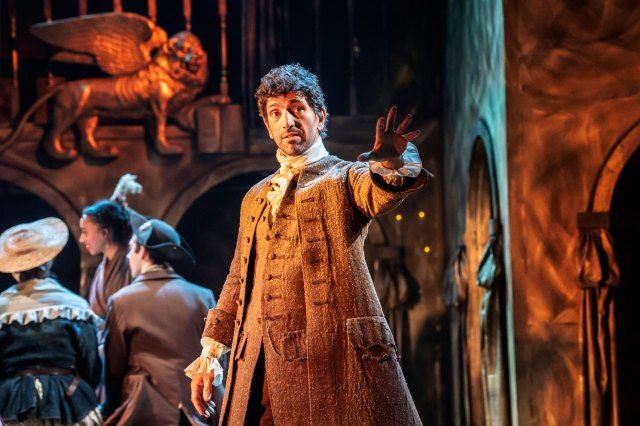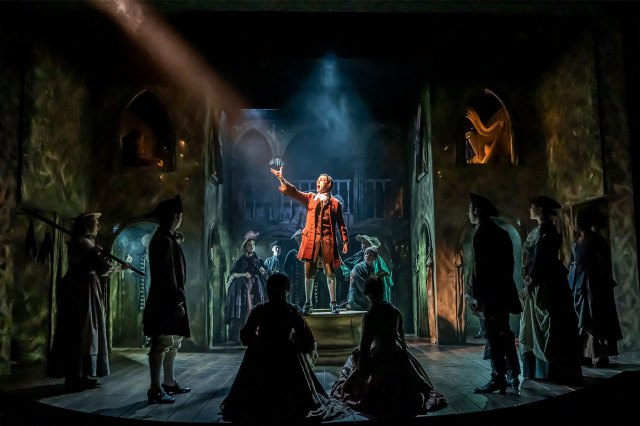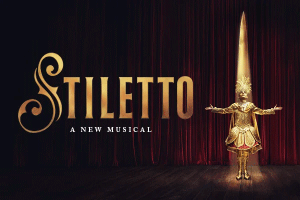Stiletto at Charing Cross Theatre – review
Tim Luscombe and Matthew Wilder’s new musical runs until 15 June

There’s an extensive list of trigger warnings in the programme for Stiletto, the lavishly produced, altogether surreal musical-opera hybrid currently crammed into the limited confines of Charing Cross Theatre. While it’s appropriate to alert audiences to references to sensitive subjects such as suicide, racism and sexual misconduct, we might also have been apprised of the possibility of headaches from repeatedly suppressed inappropriate laughter or aural fatigue from being solemnly belted at for the best part of two and a half hours.
If ambition and eclecticism were all then Matthew Wilder and Tim Luscombe’s Venetian extravaganza would be a triumph, but for most of this baroque, mindbogglingly uneven evening you may find yourself wondering who this is aimed at, and what exactly they were thinking. Luscombe’s script, peppered with random Italian phrases presumably lest we forget where we are, in spite of the gargantuan candelabras and the winged Lion Of Venice dominating the back wall of the set, charts a love story between castrato singer Marco Borroni and beautiful Giola, whose performing ambitions seem limited by her lowly social position and African slave ancestry.
Not content with being a simple romance in gorgeous dressings (and David Gilmore’s production really does look ravishing), the book is egregiously overstuffed with plot strands and extraneous characters. So we get Marco’s horny patroness trying to seduce him with lyrics like “why should we even care, it’s just another derrière” (clarion-voiced Kelly Hampson is mightily impressive for putting over this bizarre role without dissolving into fits of unseemly giggles), her conniving rascal of a husband (Douglas Hansell, very loud, very committed) and his accountant-with-a-conscience boyfriend Luigi (Sam Barrett, heroic). Then there’s Greg Barnett emoting volubly as Marco’s murderously jealous teacher Faustino who he’s also been sleeping with (“when we’re making love, all you do is push and shove”) and a non verbal sidekick (endearingly played by Connor Wood) who you can bet will get a big number at a moment of dramatic crisis (he does). At least we’re spared the grisly details of how our hero maintains his voice (castrati had their testicles removed at a young age to preserve their high pitched sound, many not surviving the process).

Jack Chambers invests Marco with a puppyish likability and a vocal register that accommodates the demands of Wilder’s stratospherically high compositions with little apparent strain (a masked mezzo soprano, Jennie Jacobs, stands in during the sequences where Borroni performs his classical repertoire). Jewelle Hutchinson’s Giola sings magnificently, moving with ease between a modernish diva sound and something more lofty and classical.
Ultimately though, a talented cast is thwarted by an unwieldy script, and lyrics that suggest somebody’s just bought a rhyming dictionary and is determined to get their money’s worth out of it. Swirl in music that sounds like the result of a bet to mash together every musical theatre style from Kander and Ebb through Lloyd Webber to Lin-Manuel Miranda (there’s a bit of half-hearted rapping) and tie it up in a quasi-operatic bow, and you have a rich yet unsatisfying Italianate stew.
Visually, it’s a feast with Ceci Calf’s set and Ben Ormerod’s lighting evoking a golden but sinister 18th century Venice, and swishily opulent costumes by Anna Kelsey. It’s wonderful to hear an actual harp as part of Simon Nathan’s orchestrations, played by Jae Alexander’s exquisite, larger-than-usual band which, in tandem with the company of fine voices, often succeeds in making the score sound better than it is.
The title Stiletto refers to the knife used in a murder which closes the sombre first half and sets in motion an equally earnest second act that frequently lurches into the risible. Act two opens with a gossipy chorale that devolves into a deranged bit of group choreography that almost elevates the whole show into classic camp, and one wonders if Stiletto might fare better as a tongue-in-cheek send-up: Carry On Castrati perhaps. As it stands, a lot of money and talent has been sunk into the sort of thing that used to flop at the Piccadilly or the Shaftesbury in the 1990s. Bewildering.

















